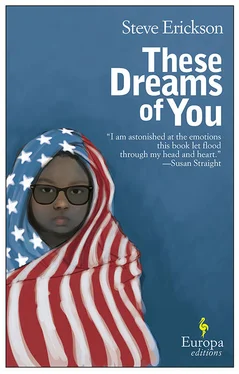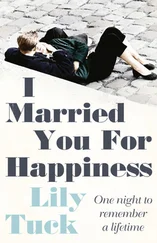In Hyde Park, Molly holds the girl’s hand as they watch Zan and Parker cross Kensington Road and make their way to the Ethiopian embassy. Ninety seconds after the father and son have disappeared around the farthest corner of Prince’s Gate, Molly leads the girl from the knolls of the park between Carriage Row and the Serpentine, in the direction of Earl’s Court where Molly has been staying, exactly the opposite way from where Zan and Parker will go looking for them an hour after visiting the Ethiopian ambassador.
At Earl’s Court the woman and girl catch the Circle Line to Westminster, where they transfer to the Jubilee Line that takes them to Waterloo. Ascending from the underground onto the main level of Waterloo Station, they board the train for Hampton Court, the same train they rode before.
By the time the woman and girl disembark at Hampton Court, the warm morning has become an unseasonably warm afternoon, unlike the last time they came to the palace when black billowing clouds rolled across the sky.
It’s an hour and a half since Molly told Zan that they would meet. The woman and girl follow the same red brick bridge to the palace and beyond.
Am I a ghost? wonders the woman on the edge of the three-hundred-year-old maze. It seems like the two stand there all afternoon before she pushes Sheba toward the maze’s entrance. “Remember?” she says to the girl, who turns to her. Did I become a ghost, Molly thinks, when I stole the motherhood I never was worthy of? “I’ll come find you,” and Sheba walks toward the entrance with no discernible trepidation, and disappears.
Molly remembers when she was a girl living in Berlin a few years before the Wall fell and her mother took her to the southern part of the divide not far from Checkpoint Charlie, near what used to be a recording studio and, before that, an old movie studio. There, as though a prophecy of what was to come, the Wall unraveled into a stone labyrinth between east and west, and within the maze Molly hid from her mother, running down concrete blue passages canopied by sky and the dark tunnels sheltered by the debris of surrounding construction. Winding her way to the center of the maze, she waited and her mother always found her, the mother’s ear for the music of her daughter as unfailing as Molly assumes a true mother’s always will be.
If I’m a ghost, can I pass through the maze’s shrubbed walls to the center? Already be there waiting when Sheba gets there? So the girl will know she’s never lost and that Molly will never lose her? The woman knows her own music has faded. She can hear her decrease in volume, she hears herself turned down. When she hears music from the maze, when she hears the girl’s music wind its way back to her, she knows there’s no mistaking it for the echoes of her own.
She follows the music in. She goes right to the girl at the center; Sheba looks up at her. Since Molly came, she hasn’t sucked her thumb until now. “I’ll never lose you again,” Molly says.
They hide in the hedges when the palace closes. Has anyone ever hidden overnight in the maze? She swallows the child in her arms so as to keep her music quiet— Jasmine, I saw you peeping —and then when night falls she unfolds herself to let the child out, and a tune smokes skyward. They lie in the center, the girl in the crook of the woman’s arms, and watch it drift to a star.
Unable to dislodge Sheba from her place next to Molly, Viv falls asleep with her on the floor, the outside noises of the neighborhood flickering like embers beyond the window. It’s early in the morning — Viv isn’t sure of the time — when she lurches awake to the sound of the door, and there against the light of the outer hall are two silhouettes that need no light other than the one in her heart.
Staring at each other, Viv and Zan have so many of the same questions — where were you? why did you go? are you all right? — and share so few answers except one — never mind; never leave again — that all the questions cancel each other out. Her son puts his arms around her in a way that he hasn’t since he was Sheba’s age and says, “We thought you were in Berlin.”
“Berlin?” she says.
Zan shrugs helplessly, “I. . ” and she touches the marks on his face where he was beaten and throws her arms around him. They hold each other, one or the other reaching over to turn off the light in the hallway outside the door, one or the other quietly kicking the door closed until they’re back in the dark. On the floor by Molly, Sheba sleeps.
She is two again, as when her other mother with the blue-green hair first came to get her in Ethiopia, and now as then the child is too shackled by loneliness to speak, the child who never has felt loved first and foremost, loved beyond and before anyone else, the child who must compete with other children for love and be always convinced she has lost, who somehow can imagine a blind parental love unconditioned even as she doesn’t yet believe she has known it. Like someone once said of God, if you can imagine such a love then it must exist.
At the center of the maze, when the little girl feels a single tear leak from her eye, she turns in the woman’s arms so no one can see it and so it soaks nothing but the ground beneath them. The girl is too little to know how profound it is to feel nowhere to belong; maybe no one at any age understands feeling grief for what can’t be remembered. But though she barely remembers anymore the world she came from, half of her brief lifetime ago, she knows she never wanted to leave it, that she left part of herself there, so her grief is a secret from herself and until she learns the word for this secret then it’s not a grieving that heals anything.
Then who are you? Molly says to the girl in her arms, and are we really here? Are you who I think you might be, or just who I always hoped you to be but never were? Is my own mother here with us now? Do I hear her wandering the green passages just the turn of a corner away, or does she hear you, mistaking your music for mine? I never called you by a name except once — but is it yours? and do you need one? Or is it just I who need for you to have one?
Does one need to travel a birth passage, womb to uterus, to be a daughter, if already you’re the descendant of an unforgiving century? Tell me now, if you know, because now I must leave by the other passage at the other end, that emerges to a place that it’s not yet time for you to go.
A few minutes later Viv must pull Sheba away from the bed, however adamant the girl is otherwise. “Come on,” she says quietly, “come,” but Sheba slips from Viv’s grip; Zan gently takes the girl’s other hand and tries to draw her away as well. The girl resists and when she begins to cry — always the loudest little person Zan has known, more volume per capita than any single body he’s ever heard, like a boombox in a confessional — no sound comes from her, Radio Ethiopia gone silent, just the twisting of her little face. If Viv and Zan are to have with Sheba at least one more act of parenthood, this must be it: “She’s not there anymore,” Viv whispers to the girl, trying to think of a way to say it, “she’s here, she’s around us,” looking around them in the dark, “but not there ,” indicating the body; and Sheba, supernaturally cognizant beyond what the span of such a short life allows, wonders how many mothers she has to lose, into how many mothers’ bodies she has to press her own, into how many families she has to storm her way in order to make a home. “She’s not there but she’s here,” says Viv, “let her go,” and — though she doesn’t say it out loud — be my daughter again.
Читать дальше











